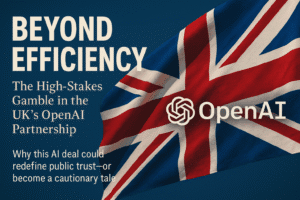Beyond Efficiency: The High-Stakes Gamble in the UK’s OpenAI Partnership
The UK’s partnership with OpenAI represents more than a productivity initiative—it’s a defining moment for balancing AI innovation with public trust. While touted as a means to improve healthcare, justice, and defense, critics warn that the deal risks granting OpenAI access to sensitive public data, raising ownership and privacy concerns.
The use of OpenAI’s models in tools like “Humphrey” for civil services highlights the need for strict accountability, especially given past AI failures in justice and welfare systems. Digital rights advocates, such as Foxglove, question the enforceability of the partnership’s safeguards, pointing to potential conflicts between profit motives and public welfare.
Economically, the UK’s reliance on foreign AI giants could stifle local innovation and ethical-first approaches. Additionally, unresolved copyright and consent issues, as seen in global lawsuits against AI training practices, remain a flashpoint. Experts emphasize the importance of transparency, auditable AI systems, and stronger data sovereignty. Ultimately, the partnership’s success hinges on whether democratic oversight can prevent public data from being exploited for private gain.

Beyond Efficiency: The High-Stakes Gamble in the UK’s OpenAI Partnership
Why this AI deal could redefine public trust—or become a cautionary tale
The UK government’s new agreement with OpenAI isn’t just another tech collaboration—it’s a litmus test for democracies navigating AI’s promise and peril. While framed as a tool to “boost productivity” in healthcare, justice, and defense, the fine print reveals deeper stakes: sovereign data access, ethical guardrails, and the outsourcing of public infrastructure to a private, U.S.-controlled entity.
The Unspoken Trade-Offs
- Data for Development:
OpenAI gains potential access to the UK’s “treasure trove of public data” (as critics term it)—health records, legal cases, educational materials. This fuels AI model refinement, but raises questions:
Who owns insights derived from citizen data?
Will sensitive datasets be walled off, or become training fodder?
- The “Humphrey” Experiment:
The UK already uses OpenAI models in its “Humphrey” civil service tools. Scaling this to high-risk sectors like justice or defense demands unprecedented accountability. Past AI failures (e.g., biased parole algorithms, flawed welfare systems) show the human cost of missteps.
- Fox in the Henhouse?
Digital rights group Foxglove’s warning resonates: OpenAI’s commercial interests may clash with public good. The non-binding “safeguards” lack enforcement teeth—a concern amplified by Sam Altman’s opaque governance history.
The Bigger Picture: UK’s AI Crossroads
- Economic Hail Mary: With growth near zero, the government sees AI as economic salvation. But betting on foreign tech giants (OpenAI, Google, Anthropic) sidelines homegrown UK AI firms, despite their ethical-first approaches.
- Copyright Flashpoint: Musicians’ lawsuits against AI training mirror a core tension here: Will public data be used without consent? The deal sidesteps this existential debate.
- Global Signaling: This partnership positions the UK as an AI adopter, not a regulator—contrasting the EU’s strict AI Act. Risks creating a “race to the bottom” on oversight.
Expert Voices: Hope vs. Skepticism
- Dr. Gordon Fletcher (Univ. of Salford): “Freeing skilled staff for complex tasks could work—if transparency and minimal data usage are prioritized.”
- Martha Dark (Foxglove): “The vagueness is alarming. Public data shouldn’t subsidize private profit without ironclad protections.”
- UKAI Trade Body: Warns the UK’s “big tech focus” overlooks local innovators better aligned with public values.
The Path Forward
For this partnership to avoid backlash, the UK must:
✅ Demand auditable AI: Require OpenAI to disclose training data sources and decision pathways.
✅ Fortify data sovereignty: Legally ringfence sensitive sectors (e.g., child welfare, national security).
✅ Invest locally: Channel AI savings into British AI R&D—balancing efficiency with strategic autonomy.
Productivity gains are seductive, but the real test is whether democratic oversight can tame commercial AI’s wildest impulses. If safeguards remain vague, this “prosperity for all” pledge may become prosperity for some—at the public’s expense.
You must be logged in to post a comment.